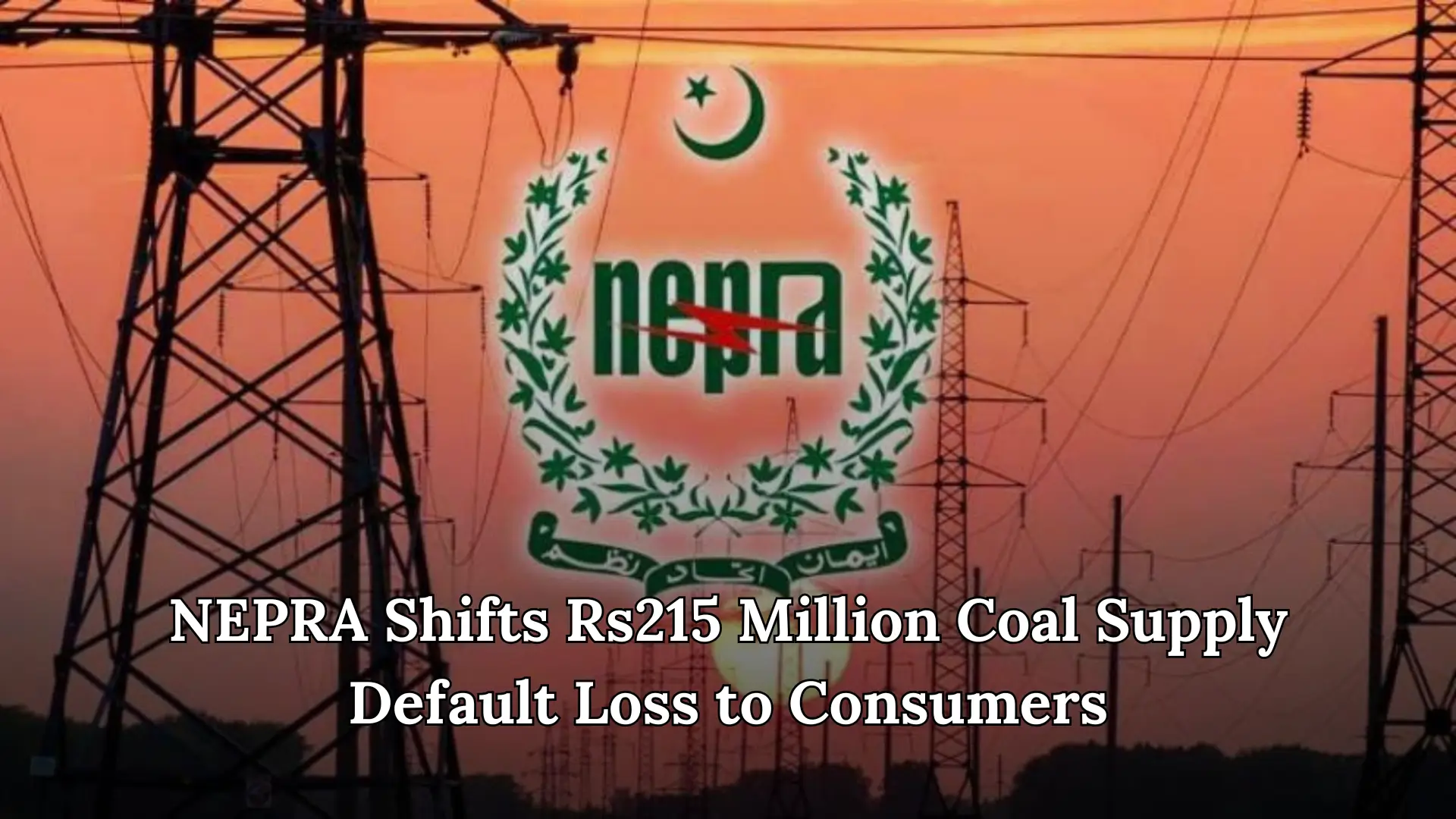NEPRA Shifts Rs215 Million Coal Supply Default Loss to Consumers. Electricity consumers in Pakistan are facing yet another financial burden. The National Electric Power Regulatory Authority (NEPRA) recently approved a decision to pass Rs215 million in losses from coal supply defaults directly onto consumers. This decision has caused public concern as electricity prices in the country are already high, and the new addition increases the cost of electricity for households and businesses alike.
Financial Burden on Consumers
NEPRA’s decision means that losses caused by coal suppliers’ defaults must now be covered by consumers through higher tariffs. The supplier in question failed to meet its contractual obligations, resulting in additional costs for power plants. These extra costs are now being shifted to end-users, increasing the overall financial burden on the public. Consumers, who already face some of the highest electricity tariffs in the region, will have to pay more due to this recent regulatory ruling.
Supplier Default and ‘Force Majeure’ Claims
The coal supplier that caused the loss claimed a ‘force majeure’ situation to justify its inability to supply coal as agreed. They argued that unforeseen circumstances, including congestion at the South African coal terminal and tensions between India and Pakistan, prevented them from fulfilling the contract. However, other suppliers continued to supply coal during the same period without interruption. This indicates that the ‘force majeure’ claim was used as an excuse, enabling the supplier to benefit from higher prices while failing to meet contractual obligations.
Supply Chain Disruption and Breach of Contract
The breach of contract led to significant supply chain disruption. The affected power plant had to purchase alternative coal at a higher price. The additional cost incurred due to this substitution was $691,931 (approximately Rs197 million). This extra expense directly impacted consumer tariffs, meaning households and businesses are now paying more for electricity to cover a loss they did not cause. Long-term contracts, meant to ensure stable supply and prices, were disrupted, highlighting the vulnerability of the power sector to supplier non-performance.
NEPRA’s Regulatory Actions
NEPRA’s decision to pass the financial burden to consumers raises serious questions about regulatory oversight. Instead of imposing penalties on the defaulting supplier or seizing their performance guarantee, NEPRA allowed the supplier to continue operations. In fact, the same supplier was awarded the tender for the same power plant on June 11, 2025, despite their previous breach. This has led to criticism that NEPRA prioritizes supplier interests over consumer protection, creating a system where suppliers can operate without fear of severe consequences.
Lack of Penalties and Consumer Protection
The situation reflects a larger problem in Pakistan’s regulatory framework. When suppliers fail to meet obligations, there are often no significant penalties or enforcement actions. The defaulting supplier in this case faced no effective punishment, and their performance guarantee was not utilized to cover the losses. This regulatory inaction leaves consumers vulnerable to financial losses and discourages accountability among suppliers.
Impact on Electricity Prices
The direct impact of NEPRA’s decision is the increase in electricity tariffs for consumers. The Rs215 million loss will be divided among all electricity users, effectively raising the cost of power. This financial pressure is particularly significant for households and small businesses already struggling with rising energy costs. Over time, such regulatory decisions can erode consumer trust and increase public dissatisfaction with both the power sector and regulatory authorities.
Broader Implications for the Power Sector
This incident highlights critical challenges within Pakistan’s power sector. Contractual breaches by suppliers, lack of regulatory enforcement, and the passing of losses to consumers undermine the stability and efficiency of the electricity system. If unchecked, these practices can weaken the power sector, deter potential investors, and harm the overall economy. Consumers, meanwhile, bear the financial brunt of these inefficiencies, affecting their disposable income and economic wellbeing.
Recommendations for Regulatory Reforms
To prevent similar situations in the future, NEPRA and other regulatory bodies must take decisive action:
- Strict Enforcement: Ensure suppliers adhere to contract terms and hold them accountable for defaults.
- Consumer Protection: Prioritize the interests of electricity consumers and avoid passing losses onto them unnecessarily.
- Penalties and Guarantees: Implement and enforce penalties for non-compliance, and utilize performance guarantees to cover losses.
- Transparency: Maintain clear reporting on supplier performance and regulatory decisions to build public trust.
Regulatory reforms are essential not only to protect consumers but also to strengthen the electricity market and ensure sustainable operations.
Conclusion
The NEPRA decision to pass Rs215 million in coal supply default losses to consumers exposes gaps in regulatory oversight and consumer protection in Pakistan’s power sector. Supplier non-performance and ineffective penalties have shifted the financial burden onto households and businesses, raising electricity tariffs and adding economic pressure.
To safeguard consumer interests, NEPRA must enforce stricter regulations, penalize defaulting suppliers, and ensure that losses are not unfairly borne by the public. Failure to address these issues will continue to strain consumer finances and negatively impact the country’s economic stability.
















